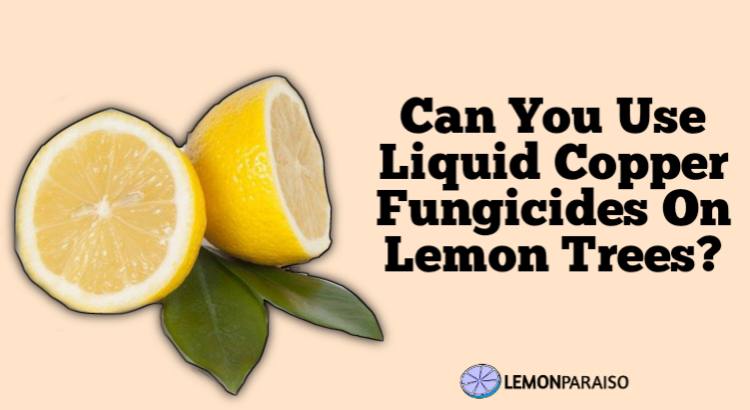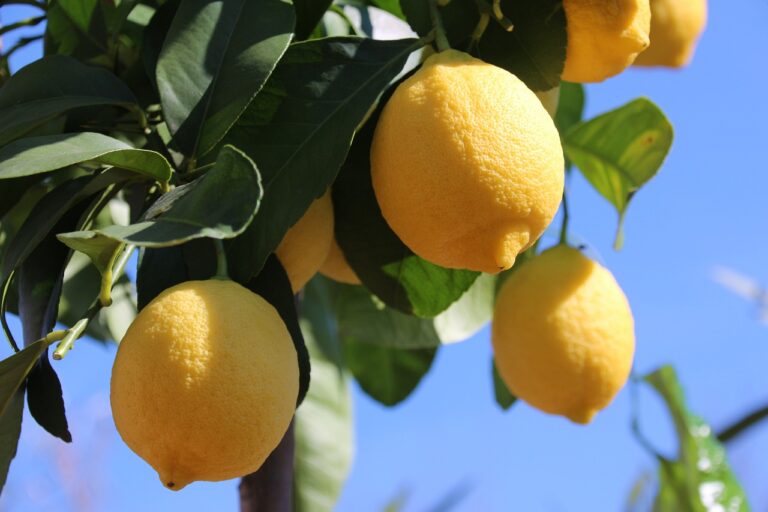Can You Use Liquid Copper Fungicides On Lemon Trees?

Lemon trees are a popular fruit tree choice for many gardeners due to their delicious and refreshing fruit, as well as their attractive appearance. However, like all plants, lemon trees are susceptible to various diseases and pests, including fungal infections. One commonly used method for controlling fungal diseases on lemon trees is the use of liquid copper fungicides.
Can Liquid Copper Fungicide Be Used On Lemon Trees?
Liquid copper fungicide can indeed be used on lemon trees as a preventative measure against fungal diseases. This fungicide is a popular choice for gardeners and farmers alike, as it has proven to be effective in controlling various fungal infections that can affect citrus trees.
By applying liquid copper fungicide to lemon trees, you can effectively protect them from diseases such as citrus canker, melanose, and greasy spot. In addition to these common fungal issues, liquid copper fungicides can also help control bacterial diseases that may threaten the health of your lemon trees.
To ensure the product’s efficacy, it is essential to follow the label instructions and recommended application rates. Overall, using liquid copper fungicide is a safe and effective way to protect your lemon trees from damaging fungal infections.
What Are The Benefits Of Using Liquid Copper Fungicide On Lemon Trees?
The benefits of using liquid copper fungicide on lemon trees are numerous, starting with its ability to prevent and control various fungal diseases. By effectively tackling these issues, the fungicide promotes the overall health of your lemon trees, leading to better growth and fruit production.
Moreover, liquid copper fungicide has a low risk of resistance development among targeted pathogens, which ensures its long-term effectiveness. Another advantage is that it is less toxic to beneficial insects and pollinators compared to other synthetic fungicides.
When used correctly, liquid copper fungicide is a cost-effective solution for maintaining the health of your lemon trees. Lastly, it is an environmentally friendly option, as it decomposes quickly, leaving minimal residue in the soil.
How Often Should Liquid Copper Fungicide Be Applied To Lemon Trees?
The frequency of liquid copper fungicide application on lemon trees depends on the specific disease being targeted and the local environmental conditions. Generally, it is advisable to apply the fungicide every 10 to 14 days during the growing season, especially when the weather is humid and rainy, which promotes fungal growth.
For diseases such as citrus canker and melanose, it is best to start applications in the spring, just before new growth emerges. Continue the applications throughout the growing season, and if necessary, apply one final treatment in the fall. Always follow the label instructions for the specific product you are using, as they may vary. Additionally, be sure to monitor your lemon trees for signs of infection and adjust the application frequency as needed.
Are There Any Precautions To Take When Using Liquid Copper Fungicide On Lemon Trees?
Yes, there are several precautions to take when using liquid copper fungicide on lemon trees. First, always wear protective clothing, including gloves and eye protection, when handling and applying the product.
Avoid applying the fungicide when temperatures are above 85°F (29°C) or when direct sunlight is intense, as this may cause leaf burn. It is also essential to avoid using liquid copper fungicide in combination with other pesticides or fungicides, as some mixtures may be phytotoxic to your lemon trees.
Be sure to thoroughly read and follow the label instructions for the specific product you are using, as this will provide essential information on application rates and safety precautions. Lastly, it is crucial to store the fungicide in a cool, dry place, away from children and pets, to prevent accidents.
What Are Some Alternative Fungicides For Lemon Trees?
There are several alternative fungicides for lemon trees, which can be used depending on the specific disease and local environmental conditions. Some common alternatives include neem oil, sulfur-based fungicides, potassium bicarbonate, and biological fungicides like Bacillus subtilis or Trichoderma harzianum.
Neem oil is an organic option with both fungicidal and insecticidal properties, making it a versatile choice for lemon tree care. Sulfur-based fungicides are effective against a wide range of fungal diseases and are suitable for use in organic gardening.
Potassium bicarbonate is a contact fungicide that can be used to control powdery mildew and other fungal diseases, and it is generally safe for beneficial insects. Biological fungicides, such as Bacillus subtilis or Trichoderma harzianum, contain beneficial microorganisms that can help suppress disease-causing pathogens.
When choosing an alternative fungicide, it is essential to consider the specific needs of your lemon trees, the diseases you are targeting, and the environmental impact of the product. Always read and follow the label instructions for proper application and safety precautions.
How Can I Prevent Fungal Diseases On My Lemon Trees?
Preventing fungal diseases on your lemon trees involves a combination of cultural practices and proactive treatments. First, ensure that your trees are planted in well-draining soil and receive adequate sunlight, as this promotes a healthy growing environment.
Properly space your lemon trees to allow for good air circulation, which helps to reduce humidity and prevent fungal growth. Regularly prune your trees to remove dead or diseased branches and maintain their overall health. Water your lemon trees using drip irrigation or a soaker hose, as wet foliage can create an ideal environment for fungal pathogens.
Monitor your trees for any signs of infection and apply fungicides as needed, following a preventative schedule if your region is prone to specific diseases. Lastly, maintain proper nutrition by fertilizing your lemon trees according to their specific needs, as healthy trees are better equipped to resist diseases.




